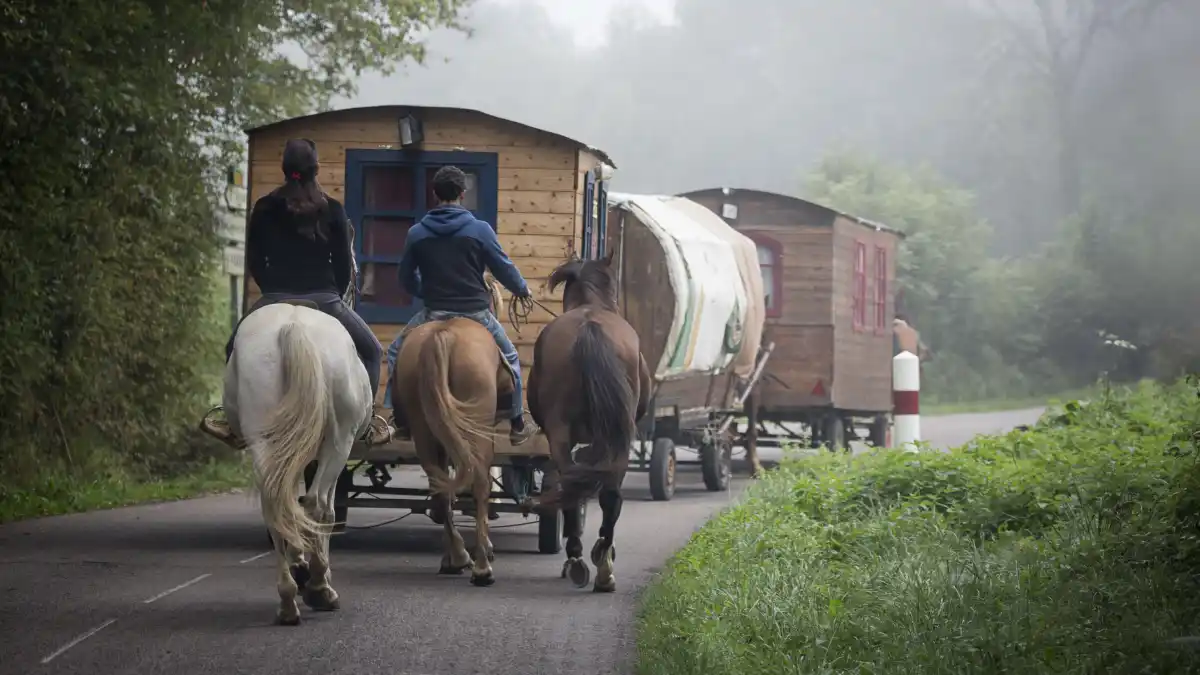How Fossil Fuels Made the World Small—And Why the Green Dream Will Make It Vast Again
In 1873, Jules Verne published what remains his most acclaimed novel: Around the World in Eighty Days. An English gentleman, Phileas Fogg, with his valet Passepartout, set out to circumnavigate the globe in eighty days—an insane feat for its time. The entire escapade began as a gentleman’s wager at the Reform Club, where Fogg staked his fortune and reputation on the idea that the Earth could be looped like a racetrack within the allotted period.
To us, raised in the age of discount airlines, airport lounges, and endless passport stamps, it may sound quaint, even laughable. Eighty days? That’s a long layover in Doha. But in the 19th century, the notion bordered on lunacy. It was not simply the distance—it was the cost, the risk, the very audacity of imagining the planet as something that could be conquered by mere schedules and tickets. Fogg was a wealthy man, and wealth bought him the privilege to dream such dreams. Ordinary mortals? They traveled as far as their legs, their carts, or perhaps a mule could carry them.
Take my ancestors in rural Austria and Bohemia. Their known world was bounded by the next village, perhaps two villages over if there was a festival or a marriage to justify the risk. Anything farther was not simply “a bit of a stretch”—it was exotic, dangerous, and possibly pointless. Journeys were slow, pulled by horses or oxen, ferried on sluggish rivers, or at best rattling along on embryonic stretches of railway. Compared to today, time itself moved with the inertia of glaciers.
This post first appeared in 2019, back when I still entertained hope that rational arguments might sway public sentiment. I’ve since remastered it—sharpened the edges, clarified the threat, and realigned it with the Grimwright ethos: use what works, discard the rest, and always—always—question the narrative. The date remains unchanged as a historical marker. The content does not.
The planet was vast beyond comprehension, and not merely because of distance. There were still blank swathes on the maps, places existing only as whispered legends or dark patches labeled “here be monsters.” For the overwhelming majority of humans, the world was the local parish, the market square, the fields and forests within walking distance. To imagine leaving one’s continent for pleasure—or worse, curiosity—would have sounded like madness. Travel was arduous, dangerous, and typically fatal unless you were either fabulously wealthy or forced by trade. Many who ventured far never returned; those who did often came back altered, scarred, or broken. The faraway remained a mystery, not an option.
Fast forward twenty-five years after Verne’s publication, and my grandfather enters the stage, born in 1899. The problems of travel hadn’t much changed since Phileas Fogg had chased timetables across the world. But within his lifetime, the globe would undergo a violent contraction. When he was born, circling the Earth in eighty days would still have been ruinously expensive and fraught with uncertainty. When he died more than eighty years later, the Earth could be conquered in under two days for a modest sum, provided your layovers were mercifully short and the airline meals didn’t kill you first.
Think about it: when he entered the world, the pinnacle of transport was the coal-fired steamship, the smoking locomotive, and the noisy, cantankerous motorcar sputtering like a wheezing asthmatic. Horses still clogged the cities, leaving behind a daily tide of manure. When I entered the world, we already had supersonic civilian aircraft, jumbo jets ferrying tourists like cattle across the oceans, and men bouncing on the Moon. My grandfather, an old man by then, lived to see the time it took to cross the planet collapse from months to hours. He could have boarded a Concorde, crossed the Atlantic in three hours, and been home for supper—a prospect utterly inconceivable at his birth.
That, dear reader, is the sorcery of fossil fuels. For the first time in human history, ordinary people—not just merchants or monarchs—were granted access to the whole damned planet. The world shrank, folded in on itself, became accessible.
And I should know: I’ve circled the globe, stood on every continent, and shaken the hands of friends on every one. Real friends, the flesh-and-blood kind, not pixelated avatars. A hundred years ago, such breadth of acquaintance would have been the rare boast of explorers, aristocrats, or lunatics. Today it’s banal—your barista has probably seen more of the world than Marco Polo. The extraordinary has become ordinary, because jet fuel made it so.
But it wasn’t just the travel. With it came an explosion in living standards, in choice, in freedom itself. The miracle of flight, the reliability of shipping, the endless arteries of highways—all running on oil and coal and gas—birthed a civilization so comfortable it cannot even imagine its fragility. Two millennia ago, Roman traders might need a month to creep from Alexandria to Rome, at the mercy of winds and currents. Cargo spoiled. Lives were lost. The entire Mediterranean was an unpredictable soup. Only with coal, then oil, did the seas finally bow to timetables. Ships became reliable, cargo predictable, bananas and silk and toys and phones and ideas all within arm’s reach. Air travel shrank the world to a weekend jaunt. Breakfast in London, dinner in Tokyo, a Sunday spent shopping in New York. Such luxury once reserved for emperors became the property of schoolteachers and plumbers. All thanks to the dense, miraculous liquid hydrocarbons beneath our feet.
Bananas, for example. A hundred years ago, they were mythical fruit. Now they rot in supermarket bins for lack of buyers. Refrigeration, containerization, and cold chains stitched together a planetary feast. Mangoes in Oslo, salmon in Singapore, champagne in Shanghai. Cultures collided, intermingled, widened. The parish boundaries dissolved. Our ancestors, bound to prayer and bread, would gape at the sheer obscenity of choice.
Now imagine it all gone.
Picture airports, once buzzing hives, standing as weed-choked mausoleums of a dead civilization. Shipping containers, once the building blocks of globalization, rusting in abandoned harbors like the skeletons of dinosaurs. Your supermarket shelves, once groaning with abundance, now reduced to cabbage, turnips, and perhaps a rare potato if the harvest was merciful. The world, once vast and then compressed, balloons again into an unbearable largeness. You return, unwillingly, to the village. To the silence. To the dim horizons.
Air travel? Gone overnight. Yes, you will be told of electric airplanes. And yes, they exist—like rare rodents in laboratory cages. But their ranges are pathetic, their costs ruinous, their utility laughable. The dream of electric transcontinental flights is vaporware. And shipping? Equally doomed.
The great Achilles’ heel is the battery. It charges too slowly, it stores too little, and despite the marketing, it is nowhere near the compact ferocity of oil. A single jerrycan of diesel contains more usable energy than a Tesla battery the size of a coffin. Hydrocarbons are a cheat code of physics: compact, portable, and refilled in minutes. A tank of fuel propels a car for hundreds of kilometers; a truck will devour a thousand before needing a drink. Container ships? They are titans, crossing oceans on a single fill. No battery can dream of that endurance. Wind sails for modern freighters? Quaint, picturesque, utterly impotent. Wind is as fickle now as it was when Odysseus cursed the gods for it.
Strip away fossil fuels and the modern world dies. Not in theory—in practice. Land transport becomes obscenely expensive, not by twenty percent, but by four, five, six times. Private vehicles revert to being the baubles of elites. The rest trudge back to mass transit, itself crippled by unreliable power grids. Remember the blackout last week? That was just a preview.
Yes, you’ll still have your e-scooters. Your e-bikes. Cute toys. But beyond the limits of a city, they are as useful as roller skates on the Autobahn. Trucks will limp and stall. Construction machinery will falter. Prices will climb until the very act of building becomes a luxury.
Rail? Yes, it will matter again—but rails don’t run everywhere, and when the lights go out, they run nowhere at all. Beyond the network, communities drift back into isolation, as they once were.
Consider the Waldviertel, the “Wood Quarter” north of Vienna. A mere 80 kilometers from the capital, it once served as a refuge for outlaws. Austria’s most notorious bandit, Grassl, hid there, so elusive that imperial troops struggled to catch him. Why? Logistics. Even that short distance was an expedition of danger and cost. Today, a highway gets you there in under an hour. Back then? Two weeks, if you returned alive. That is the world we are flirting with. A world where eighty kilometers is not an hour’s drive but a campaign.
And don’t think owning an electric car will spare you. Electricity will be rationed, sporadic, politicized. If you have what others lack, you become prey. Mobility itself becomes a mark of privilege.
Shipping shrinks to a crawl. Battery ships forced to “harbor hop,” each recharge consuming days, the trip itself stretching to multiples of former times. Capacity reduced, costs obscene. Global trade? Finished, except for luxury items so costly that even kings of old would blush. Not your iPhone—more like crown jewels.
Air travel collapses to a few zeppelins and passenger liners. Crossing the Atlantic takes weeks again. And the class system? Reborn with teeth. If you think the Titanic’s decks were segregated, wait until you see the modern equivalent. The elites will dine in glass domes above the Atlantic while the rest rot in steerage like livestock. Fossil fuels flattened classes; their absence will resurrect them.
Look at my own bloodline. Sixteen great-grandparents, none of them with higher education, all bound to soil and parish. I am the first to hold a university diploma. My father traveled as a sailor, but even he could not have imagined the faraway places I have touched. Oil, coal, and gas lifted my family out of the mud. Remove them, and we all sink back in.
Cities, those fragile hives, implode without trade. Ghost towers rise, abandoned. Populations flee to the countryside. Starvation stalks the streets. The globe, once made small, grows monstrous again. Most humans are trapped in subsistence villages, shackled to minimal distances, repeating the medieval script.
And with the return of the village comes the return of superstition, of claustrophobic smallness, of stunted possibility. The Green utopians dream of windmills and virtue, but the only ones who will enjoy their fantasy are the elites who can still afford heat and mobility. The rest of us are reduced to peasants, our horizons narrowed to the parish, our lives once more bound by distance.
Jules Verne’s miracle of eighty days will become a mockery. For the everyday person of the future, eighty kilometers will be the new impossible.




